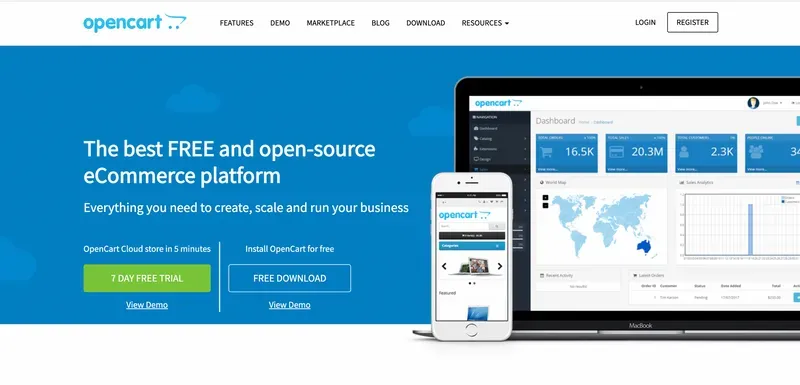Find Your Perfect Builder: Top Squarespace Alternatives 2024!
By Sonaksh Singh Rawat on 2/15/2024 · 10 minute read
Unlock the Secrets of E-Commerce Success: 7 Jaw-Dropping Squarespace Alternatives for 2024!
7 Best Squarespace Alternatives for E-Commerce Businesses
In this dynamic landscape of ecommerce choosing an e-commerce platform that suits your specific needs and budget becomes extremely important.
Squarespace has become a favorite among many businesses; however, it’s not the only option out there. This article will explore seven excellent Squarespace alternatives for e-commerce projects. We’ll further examine their features, affordability, and ease of use, helping you an informed decision.
Criteria for Evaluating Alternatives
When you’re on the lookout for Squarespace Alternatives for your business, there are certain things you must take into consideration. Carefully weighing these considerations ensures that the decision made meets business requirements.
Pricing and Cost Structure
Exploring the cost structures of various Squarespace alternatives is crucial, including a careful examination of subscription expenses, per-transaction costs, and any additional fees. It’s important to consider how these costs align with one’s budget and anticipated revenue.
Feature Set and Customization
Exploring the functionalities provided by each option reveals whether they are crafted for e-commerce ventures. It’s essential to look for essential features such as management of the product catalog, integration with payment gateways, SEO enhancement tools, and the flexibility to adapt to unique needs.
Scalability and Growth Potential
When selecting an e-commerce platform, it’s essential to consider whether it can accommodate the growth of one’s business or not. This includes its capability to handle an increased number of products, manage higher volumes of website traffic, and adapt to the changing demands of the market.
Website Performance and Speed
The velocity and efficiency of a website when choosing Squarespace alternatives are crucial factors for success in the e-commerce industry. Assessing the load times and overall performance of websites created on various platforms is vital. Websites with fast loading speeds typically experience higher conversion rates.
Mobile Responsiveness
In today’s e-commerce landscape, largely influenced by mobile users, it’s essential for a platform to be mobile-responsive. It’s important to check whether the available options provide templates that cater to mobile users and ensure a high-quality user experience across various devices.
Support and Community
Reliable customer support is crucial when facing difficulties or needing assistance with e-commerce setups. Exploring the different support avenues provided, such as instant live chat, email queries, and direct phone assistance, can significantly enhance the experience. Additionally, tapping into the wealth of knowledge available in user communities and resources offers access to troubleshooting tips and valuable advice shared by peers.
7 Best Squarespace Alternatives for E-commerce Businesses
Exploring the dynamic realm of online retail reveals several noteworthy ecommerce platforms that present themselves as strong alternatives to Squarespace. Each Squarespace alternative comes with its own distinctive characteristics, providing a diverse array of tools and features designed to assist in creating the ideal online store.
1. Shopify

Shopify is recognized as a leading e-commerce platform, superior among counterparts including Squarespace, and serves businesses of all sizes. It is adept at streamlining the creation and management of online stores through its comprehensive set of features. Some of its features include:
- Inventory Management: Shopify simplifies the addition of new products, modification of existing entries, and the overall management of the product catalog. It supports offering product variants in numerous sizes and colors.
- Payment Gateways: A broad selection of payment gateways is available on this Squarespace alternative, offering the freedom to select the most suitable option.
- Shipping Integration: The platform ensures a hassle-free connection with major shipping providers, making it easier to calculate and ship orders.
- Design Flexibility: A wide range of professionally designed templates are available, which can be customized to reflect a unique brand identity.
- Customization: Shopify allows adjustments to both the aesthetic and functional aspects of a store, ensuring it meets every specific need.
- Compatibility: It integrates effortlessly with various tools and applications, including financial management software and email marketing platforms.
Shopify’s flexibility is also evident in its pricing structure, starting at just $29 per month. The ideal plan varies depending on the desired features and the scale of product inventory.
Advantages
- User-friendly Interface: Shopify distinguishes itself with its intuitive interface, simplifying the experience for those new to the platform.
- Extensive Suite of Capabilities: This Squarespace alternative comes fully equipped with a wide range of features necessary for the smooth running of e-commerce operations.
- Adaptable for Every Business Size: Designed to serve businesses from startups to large enterprises, Shopify’s scalable solutions ensure that every company is well-prepared for growth at every turn.
- Robust Security: As a reliable source of security, Shopify offers peace of mind to entrepreneurs by safeguarding their online stores.
- Continuous Support: Shopify guarantees around-the-clock assistance, providing constant access to help whenever needed.
Drawbacks
- Processing costs: Each transaction made on Shopify incurs processing fees.
- Limited personalization options in the Basic Package: The entry-level package offers limited customization capabilities.
- Cost implications for larger sales volumes: The expenses associated with this Squarespace alternative can become considerable for businesses handling high volumes of sales.
Overall, Shopify is recognized as an excellent e-commerce platform for businesses of any size, surpassing competitors like Squarespace with its user-friendly design and comprehensive features. However, it’s important to be mindful of the transaction fees and the limited customization options in the Basic plan.
2. Woocommerce

WooCommerce emerges as a premier option for companies searching for an online business platform. Positioning itself as a strong competitor to Squarespace with its extensive range of features catering to both small and large enterprises.
As a WordPress plugin, it is celebrated for its user-friendliness and the ability to be customized extensively. It is equipped with a comprehensive set of tools for product management, payment processing, and inventory tracking. With a wide range of design options and compatibility with several payment processors, WooCommerce offers a similar level of functionality and flexibility as Squarespace.
Although WooCommerce’s core software is free, additional costs may incur for hosting and extensions.
Advantages:
-
Flexibility: The benefits of flexibility and customization offer a personalized touch, allowing businesses to tailor the experience to individual needs. This adaptability and ability to customize provide businesses with control over their operations, ensuring a more personal user experience.
-
Integration: WordPress’s seamless integration amplifies website functionality with ease, emphasizing a user-friendly approach to digital content creation.
-
Multiple Payment Options: A wide variety of payment methods cater to diverse customer needs, facilitating smoother transactions and enhancing user satisfaction.
-
Extensive Support: An extensive support network ensures a welcoming experience for all members, with a focus on sharing knowledge and solving problems collectively.
Drawbacks
- Simplistic Features: It offers rather simple features in comparison to other Squarespace alternatives.
- Learning Curve: Beginners may face a learning curve, but the journey through this dynamic platform promises growth and satisfaction.
WooCommerce represents a robust solution for businesses seeking a customizable, WordPress-centric e-commerce platform, allowing for full control over the digital storefront’s appearance and functionality.
3. Wix

Wix is known for its excellence as a user-friendly website builder, celebrated for its innovative drag-and-drop interface. Standing as a robust competitor to Squarespace, it offers a vast range of e-commerce features, including proficient product management, efficient payment processing, and an extensive assortment of design templates that can be customized to suit preferences.
Offering a free plan that allows access to basic e-commerce functionalities, this Squarespace alternative also presents premium plans starting at an accessible $14 per month for those wishing to expand their digital storefront.
Advantages
- User-friendly Interface: A beginner-friendly interface that is easy to use.
- Vast Number of Templates: A wide range of customizable design templates.
- Advanced features: Paid plans that are enriched with comprehensive e-commerce capabilities.
- Includes Free Plan: A free plan that includes essential features.
Drawbacks
- SEO Not Upto The mark: When evaluating certain website creation tools, it’s observed that their SEO capabilities may not fully measure up against all competitors in the field. U
- Transaction Fee: Users might find modest transaction charges on basic plans. Enhancing an e-commerce presence could require investing in more expensive plans to access broader features. O
- Limited Customization: Once a website is launched and makes its debut, the initial template becomes permanent, emphasizing the importance of planning and creativity before hitting the launch button.
For e-commerce entrepreneurs, the platform in discussion offers an intuitive website creation experience with a wide range of design options. However, those in need of advanced SEO features or managing large-scale e-commerce operations might find certain limitations.
4. Bigcommerce

BigCommerce distinguishes itself in the digital marketplace through its robust functionality and vast scalability options. It offers customized designs, extensive product catalog management, safe payment options, and superior SEO tools. As an outstanding Squarespace alternative, BigCommerce provides the flexibility necessary for both small businesses and large enterprises to enhance their e-commerce platforms with ease.
The pricing tiers are thoughtfully structured to accommodate businesses of various sizes, providing both monthly and annual subscription choices to meet different preferences and requirements.
Advantages
- Advanced Features: The platform comes fully equipped with advanced e-commerce features designed to power up online stores. Features like elegant product displays and quick checkouts are meticulously crafted to boost the digital storefront and enrich the shopping experience for customers.
- Adaptable: It suits needs across the spectrum, from small startups to expanding enterprises, providing a comprehensive suite of e-commerce tools aimed at driving businesses forward in a competitive market.
- Scalable: It is scalable, accommodating both large and small businesses.
- Mobile-Responsive: It ensures an optimal browsing experience, making websites look their best and meet user expectations, regardless of whether they are accessed during a subway ride or from the comfort of a home tablet.
- Integration: A wide range of app integrations is available, offering the ability to seamlessly connect with and enhance experiences, merging favorite tools and services into a cohesive experience.
Drawbacks
- Learning Curve: Some specific advanced functions could require understanding in technical areas.
- High Cost: Higher costs are associated with features designed for large-scale business operations.
BigCommerce is distinguished as a Squarespace alternative, geared towards businesses needing an e-commerce solution. Moreover, it isis feature-rich and scalable. However, it should be mentioned that there might be a learning curve for some users to completely utilize all its features.
5. Magneto

Magento stands out as a powerful and flexible open-source e-commerce platform, highly regarded by both large enterprises and small businesses alike. This platform is replete with a wide range of features and capabilities, including:
- Inventory Management: This Squarespace alternative simplifies the process of adding, managing, and selling products through an online storefront, making it convenient for businesses.
- Payment Solutions: With seamless integration with various payment gateways, Magento enables businesses to easily accept payments from customers worldwide.
- Shipping Capabilities: Integration with numerous shipping services is streamlined in Magento, ensuring quick and easy dispatch of products to customers globally.
- SEO Capabilities: Equipped with a suite of SEO tools, Magento helps in enhancing the online storefront’s presence in search engine rankings, aiding in gaining more visibility.
- Customization: Magento’s extensive customization options allow businesses to tailor their online store to match their unique brand identity and aesthetic preferences comprehensively.
Magento is available in two editions: the Community Edition, which is free but requires technical expertise to set up, and the Enterprise Edition, which is paid and comes with additional features and support, enhancing the platform’s capabilities and user experience.
As far as pricing goes, it Magento offers a free plan. The Community Edition offers a unique opportunity by providing access to a wealth of resources at no cost. This edition serves as a gateway to limitless discovery, completely free. Additionally, for entities looking into the Enterprise Edition, it starts at a competitive annual price of $22,000.
Advantages
- Feature Galore: The platform boasts an extensive selection of features and functionalities, crafted to cater to the varied needs and requirements of users. Suited for both professional and personal projects, the tools are designed for the utmost convenience.
- Designed for flexibility: This Squarespace alternative encourages users to tweak and adjust their store as needed. It offers the freedom to customize the experience precisely to individual tastes and needs, embodying control and personalization.
- Open-Source: This method of software creation welcomes developers worldwide to contribute, ensuring a variety of thoughts and creativity. Open-source not only propels technological progress but also cultivates a community among programmers.
Drawbacks
- Needs a Certain Level of Technical Expertise: Navigating the configuration and oversight of e-commerce solutions can present a maze of complexities, especially for individuals lacking technological expertise.
- High-Cost: The Enterprise Edition may be associated with a significant investment.
Magento emerges as an outstanding choice for businesses in search of a powerful and flexible e-commerce platform, packed with various features and functionalities.
However, it’s important to note that the journey to successfully setting up and managing Magento can be quite challenging, especially for those who are not well-versed in technology.
6. PrestaShop

PrestaShop offers a no-cost alternative to platforms like Squarespace, providing a flexible and open-source e-commerce solution ideal for online businesses. It boasts a versatile product catalog, multiple payment options, and various shipping methods, making it easy for businesses to establish and manage their online stores.
As an open-source platform, PrestaShop’s core software is available completely free. However, businesses need to consider other necessary expenses, such as web hosting, domain name registration, and the purchase of any additional plugins or themes they may require.
Advantages
- Open-Source Platform: Tailor-made and open-source, offering adaptability for organizations.
- Vast Selection of Themes: A wide range of themes and modules designed to enhance the functionality of your platform.
- Global Reach: Support for multiple languages and currencies, enabling a global reach.
Drawbacks
- High Maintainence Cost: Hosting and maintenance costs can gradually increase over time.
- Needs Time to get Adjusted: Beginners might find it somewhat difficult to start their journey.
- Average Customer Support: Although customer support is not on par with some of the paid platforms, it still provides a respectable level of help.
PrestaShop is recognized as a cost-effective Squarespace alternative for companies looking for a customizable e-commerce solution, requiring a higher degree of technical knowledge for optimal utilization.
7. OpenCart

OpenCart is recognized for its flexibility as an open-source e-commerce platform, aimed at supporting businesses with its highly adaptable and customizable features.
It offers a wide range of functionalities that seamlessly manage products, orders, and customer interactions. Additionally, OpenCart is notably accessible due to its open-source, free-to-use pricing structure, making it an attractive option for budget-conscious businesses.
Advantages:
- Open-Source: It’s open-source and highly economical and Offers extensive customization option.
- Easy to Use: Features an intuitive and user-friendly admin dashboard.
- Multiple Payment Options: Provides a diverse array of payment gateways and shipping methods.
- Vast Array of Plugins: Includes a broad selection of plugins and designs, enhancing the e-commerce experience.
- Top-Tier Security: Making the shopping process convenient and smooth for customers, whatever their location or payment preference, ensuring security and efficiency from browsing to delivery.
Drawbacks
- Needs a Certain Level of Technical Expertise: Requires some technical knowledge for setup and ongoing management.
- Fewer Feaures: May initially present fewer features compared to some competitors.
- Regular Upkeep: Regular maintenance and updates are likely necessary for optimal performance.
OpenCart is positioned as a prime choice for businesses seeking an alternative to Squarespace that offers flexibility without incurring significant costs. This requirement, however, entails a willingness to invest effort into its setup and maintenance.
Wrapping Up
This blog has explored seven top Squarespace alternatives for e-commerce entrepreneurs, evaluating their functionality, cost, and ease of use to assist in choosing the most suitable platform for business needs.
Ultimately, the search for a budget-friendly Squarespace alternative depends on the specific needs and resources of the business. Small enterprises with limited budgets may prioritize a user-friendly platform with minimal monthly fees, while larger businesses with more complex requirements may opt for a platform offering a wide range of features and functionalities, despite a higher monthly cost.